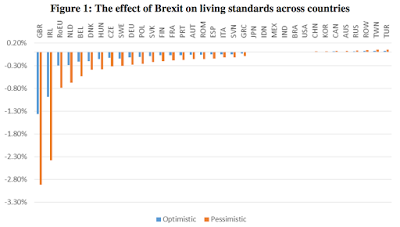
This article was last updated on April 16, 2022
Canada: ![]() Oye! Times readers Get FREE $30 to spend on Amazon, Walmart…
Oye! Times readers Get FREE $30 to spend on Amazon, Walmart…
USA: ![]() Oye! Times readers Get FREE $30 to spend on Amazon, Walmart…
Oye! Times readers Get FREE $30 to spend on Amazon, Walmart…
A paper by Swati Dhingra, Gianmarco Ottaviano, Thomas Sampson and John Van Reenen at the Centre for Economic Performance at the London School of Economics and Political Science examines the economic consequences of the United Kingdom’s exit from the European Union on both the U.K. and the European Union as a whole. With the European Union being the U.K.’s largest trading partner, Brexit will obviously have a significant impact on both economies since tariff and non-tariff barriers to trade would change.
For the purposes of this study, the authors looked at two scenarios:
1.) an optimistic scenario where the U.K. has a relationship with the EU similar to that of Norway which has full access to the EU single market as a member of the European Economic Area (EEA). In this case, there would be no tariffs on trade between the U.K. and the EU, however, there would be some non-tariff barriers that do not apply to EU members.
2.) a pessimistic scenario where there are larger increases in trade costs because, in this scenario, the U.K. is not successful at negotiating a new trade agreement with the EU. This means that trade between the U.K. and the EU is government by World Trade Organization rules, implying larger increases in trade costs than the optimistic scenario.
Let’s look at the optimistic case first. In the optimistic scenario, the authors assumed that in the ten years following Brexit, intra-EU trade costs fall 20 percent faster than in the rest of the world with non-tariff barriers within the EU falling by 5.7 percent over the decade. They also assume that the U.K.’s contribution to the EU budget would not drop to zero, rather, it would drop by 17 percent or 0.09 percent of national income; in the case of Norway, on a per capita basis, Norway’s financial contribution to the EU is 83 percent of the U.K.’s payment.
Here are the results of the effects of Brexit on U.K. living standards for the optimistic case:
Trade effects: -1.37 percent
Fiscal benefit: + 0.09 percent
Total change in income per capita: -1.28 percent or -£850
In the pessimistic scenario, the authors assumed that in the ten years following Brexit, intra-EU trade costs fall 40 percent faster than the rest of the world with non-tariff barriers within the EU falling by 12.8 percent over the decade. They also assume that, since the United Kingdom is outside the EEA, the U.K. would save more on its current contribution to the EU. The savings would rise to 0.53 percent which includes only the public finance components and excludes the transfers that the EU makes directly to universities, firms and other non-government bodies. Assuming that the U.K. government does not cut this funding, the net savings would be 0.31 percent.
Here are the effects of Brexit on U.K. living standards for the pessimistic case:
Trade effects: -2.92 percent
Fiscal benefit: +0.31 percent
Total change in income per capita: -2.61 percent or -£1700
Please note that in both of these scenarios, the authors have used a static trade model that does not account for the dynamic impacts of trade on productivity. For example, trade can have positive economic effects since it increases competition and promotes economic efficiencies. Recent research shows that these dynamic impacts on trade may be two or three times larger that the static effects. Using an estimate that a 1 percent decline in trade reduces income per capita by between 0.5 percent and 0.75 percent, Brexit would reduce U.K. per capita income by between 6.3 percent and 9.5 percent or between £4200 and £6400 per household per year. This shows that the dynamic impacts of trade could significantly worsen the situation for U.K. households when Brexit takes place.
Now, let’s look at the effects of Brexit on other nations. Obviously, the nations with the greatest trade with the United Kingdom will see the greatest effects. According to the authors’ calculations, all EU member nations are worse off with Ireland suffering the largest proportional losses from Brexit followed by the Netherlands and Belgium. Countries outside of the EU will experience economic gains as trade is diverted toward them and away from the EU; these include Russia, Taiwan and Turkey.
Here is a graphic showing the effect of Brexit on GDP by nation:
In total, the EU loses between 0.12 percent and 0.29 percent of its GDP whereas the nations outside the EU gain between 0.01 percent and 0.02 percent of GDP. When looking at actual losses, the United Kingdom will see its economy shrink by between £26 billion and £55 billion and the rest of the EU will collectively see the economy shrink by between £12 billion and £28 billion or about half of the negative economic impact experienced by the United Kingdom.
Obviously, Brexit is going to have a significant impact on the European community as a whole. The authors note that, when all is said and done, the economic consequences of leaving the EU will depend on the political policies that the United Kingdom adopts after Brexit takes place.
Click HERE to read more.
Vote for Shikha Dhingra For Mrs South Asia Canada 2017 by liking her Facebook page.
You can publish this article on your website as long as you provide a link back to this page.



Be the first to comment